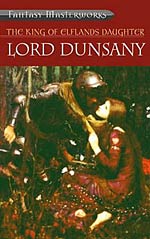
![]() verkisto
verkisto
7/26/2016
![]()
The King of Elfland's Daughter is considered a classic fantasy novel, and at least one essay describes it as one of the founding novels of modern fantasy. I don't know what that means, exactly, but it's clear that the type of fantasy being published today owes a lot to this novel. If nothing else, the narrative style seems to have inspired a lot of the fantasy writers who followed.
The very narrative dates this book, as it's peppered with "whither"s and "goodly"s, it has a tendency to speak to the reader directly, and the sentence structure is so correct that it's awkward. Plus, Dunsany has a bad habit of repeating certain things, and those certain things are repeated a lot. He speaks often of the "fields we know," and of the palace that are "only spoken of in song." I mean, every time he references those things, that's how he refers to them, even in passing. It's a little grating.
Despite that, though, the story reads very well. It's not an easy read -- it lacks the kind of compelling pull that I expect from fiction -- but it's a good story that's poetically told. Though the narrative was sometimes frustrating, Dunsany managed to tell the story with prose that was vivid, and managed to make the world of Erl light and airy. Some of the descriptions felt like they could float away with his descriptions, but not to the point where you couldn't get a sense of what he was trying to tell. It was an odd style, one that I haven't seen in other fiction.
The story does have a plot of sorts, centered on the main character, Alveric, who woos the king of Elfland's daughter, their son, Orion, and the daughter herself, Lirazel. A human man and elfin woman aren't going to have an easy relationship, and the novel tells the story of this star-crossed family. It's engaging enough to keep you reading (and I'll be honest here; sometimes I really needed something to keep me reading), and the way the story ends will keep you going until the last page.
This is another print-on-demand book, and it's unfortunate that the people who typeset the novel and no idea what they were doing. There are missing periods, extraneous words, and a horrendous paragraph formatting. Online, it's fine to set apart paragraphs with empty lines and not indent each one; in a novel, it's somewhat frustrating to read that way. Even e-books maintain that sort of formatting, and it's unfortunate that this book wasn't formatted that way. There's another edition of this book with traditional formatting and a foreword by Neil Gaiman that's still in print, and I'm disappointed that I didn't get that one instead. This was the only one available at the store, and I figured it was all that was in print.
Fantasy readers should read this, since it forms part of the foundation of the entire genre. Other readers, though, might have some trouble getting into (and staying with) the story.